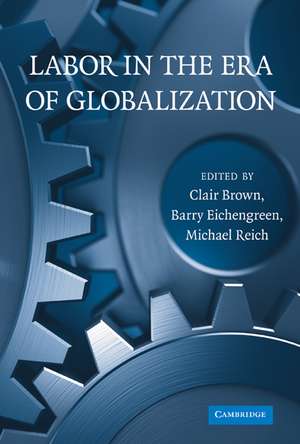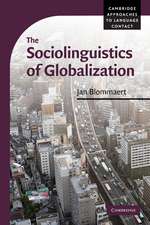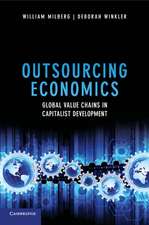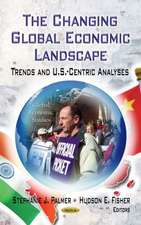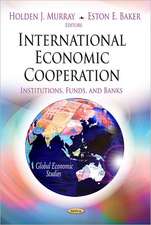Labor in the Era of Globalization
Editat de Clair Brown, Barry J. Eichengreen, Michael Reichen Limba Engleză Hardback – 22 noi 2009
Preț: 712.28 lei
Preț vechi: 828.23 lei
-14% Nou
Puncte Express: 1068
Preț estimativ în valută:
136.31€ • 142.13$ • 113.29£
136.31€ • 142.13$ • 113.29£
Carte tipărită la comandă
Livrare economică 20 martie-03 aprilie
Preluare comenzi: 021 569.72.76
Specificații
ISBN-13: 9780521195416
ISBN-10: 0521195411
Pagini: 476
Ilustrații: 53 b/w illus. 57 tables
Dimensiuni: 158 x 235 x 35 mm
Greutate: 0.77 kg
Editura: Cambridge University Press
Colecția Cambridge University Press
Locul publicării:New York, United States
ISBN-10: 0521195411
Pagini: 476
Ilustrații: 53 b/w illus. 57 tables
Dimensiuni: 158 x 235 x 35 mm
Greutate: 0.77 kg
Editura: Cambridge University Press
Colecția Cambridge University Press
Locul publicării:New York, United States
Cuprins
Introduction Clair Brown, Barry Eichengreen and Michael Reich; Part I. Political Economy and Labor Market Institutions: 1. Institutions and wages in post-World War II America Frank Levy and Peter Temin; 2. American exceptionalism and comparative political economy David Soskice; 3. Finance and labor: perspectives on risk, inequality, and democracy Sanford Jacoby; Part II. Institutions and Firm and Worker Behavior: 4. How good are U.S. jobs? Characteristics of job ladders across firms in five industries Clair Brown, Benjamin Campbell, Fredrik Andersson, Hyowook Chiang and Yooki Park; 5. Increasing labor flexibility in Japan: the role of female workers in manufacturing Yoshi-Fumi Nakata and Satoru Miyazaki; 6. Ties that matter: cultural norms and economic behavior in Western Europe Paola Giuliano; Part III. Contemporary Labor-Management Relations: 7. The new treaty of Detroit: are VEBAs labor's way forward? Teresa Ghilarducci; 8. Symphony musicians and symphony orchestras Robert J. Flanagan; 9. Wage effects of works councils and collective agreements in Germany Knut Gerlach and Wolfgang Meyer; 10. Apprentice strikes, pay structure and training in twentieth-century UK metalworking industry Paul Ryan; Part IV. Public Policy and U.S. Labor Market Structure: 11. Minimum wages in the U.S.: politics, economics and econometrics Michael Reich; 12. Understanding the causes and labor market consequences of the steep increase in U.S. incarceration rates Steven Raphael; 13. Local labor market adaptation to increased immigration David Card.
Recenzii
'The essays in this volume drill down below the surface to provide rich explanations for three decades of stagnant wages, rising inequality, and increasing income insecurity. Without ignoring the effects of globalization, immigration, deregulation, and weakening of employment protection, the authors introduce important new analyses that incorporate variously institutions and cultural norms or examine less-studied linkages such as the impact of financial deregulation on labor markets. This is an important book with fresh insights into the causes and consequences of these developments.' Eileen Appelbaum, Rutgers University
'Bringing together a stellar set of economists and political scientists, this collection weaves economic arguments together with a nuanced analysis of institutions and political choices to explain the unraveling of labor's gains since the mid-twentieth century. For anyone trying to understand, or do something about, the losses in income and security suffered by working people over the course of the last four decades, it will be an invaluable resource.' Peter Evans, University of California, Berkeley
'Labor in the Era of Globalization is an awesome mix of political economy and institutional labor economics that shows that institutions – from unions to political structures and from financial institutions to the family and to labor laws – are important determinants of economic outcomes. The book is filled with fascinating, insightful, and occasionally irritating analyses that have more to say about the macro- and microeconomics of labor than the past two to three decades of laissez-faire theorizing. The only thing missing is a health warning on the jacket: Right-wing ideologues, true believers in perfect markets, beware: reading can cause an apoplectic fit, clenched fists, or a primal scream.' Richard Freeman, Harvard University and NBER
'The uniqueness of this volume is that its research focus goes beyond the standard labor market approach of examining comparative advantages across countries as a key source of international differences of earnings, employment, and job security. In contrast, Labor in the Era of Globalization's emphasis on institutional arrangements provides a nuanced approach that allows for greater understanding of the differing labor market challenges that workers face in Europe, Asia, and the United States. Its topical coverage coupled with a dispassionate approach toward analysis suggests that this volume will generate great interest from practitioners in business, academia, labor, and government.' James Peoples, University of Wisconsin–Milwaukee
'Bringing together a stellar set of economists and political scientists, this collection weaves economic arguments together with a nuanced analysis of institutions and political choices to explain the unraveling of labor's gains since the mid-twentieth century. For anyone trying to understand, or do something about, the losses in income and security suffered by working people over the course of the last four decades, it will be an invaluable resource.' Peter Evans, University of California, Berkeley
'Labor in the Era of Globalization is an awesome mix of political economy and institutional labor economics that shows that institutions – from unions to political structures and from financial institutions to the family and to labor laws – are important determinants of economic outcomes. The book is filled with fascinating, insightful, and occasionally irritating analyses that have more to say about the macro- and microeconomics of labor than the past two to three decades of laissez-faire theorizing. The only thing missing is a health warning on the jacket: Right-wing ideologues, true believers in perfect markets, beware: reading can cause an apoplectic fit, clenched fists, or a primal scream.' Richard Freeman, Harvard University and NBER
'The uniqueness of this volume is that its research focus goes beyond the standard labor market approach of examining comparative advantages across countries as a key source of international differences of earnings, employment, and job security. In contrast, Labor in the Era of Globalization's emphasis on institutional arrangements provides a nuanced approach that allows for greater understanding of the differing labor market challenges that workers face in Europe, Asia, and the United States. Its topical coverage coupled with a dispassionate approach toward analysis suggests that this volume will generate great interest from practitioners in business, academia, labor, and government.' James Peoples, University of Wisconsin–Milwaukee
Descriere
Analyzes the causes of the decline in labor's global fortunes from 1975 to the 2000s.
